KNUT KIESEWETTER, Ich danke euch Reaktionären, 1974
Posted: February 10, 2022 Filed under: 70´s, Political Records 1 Comment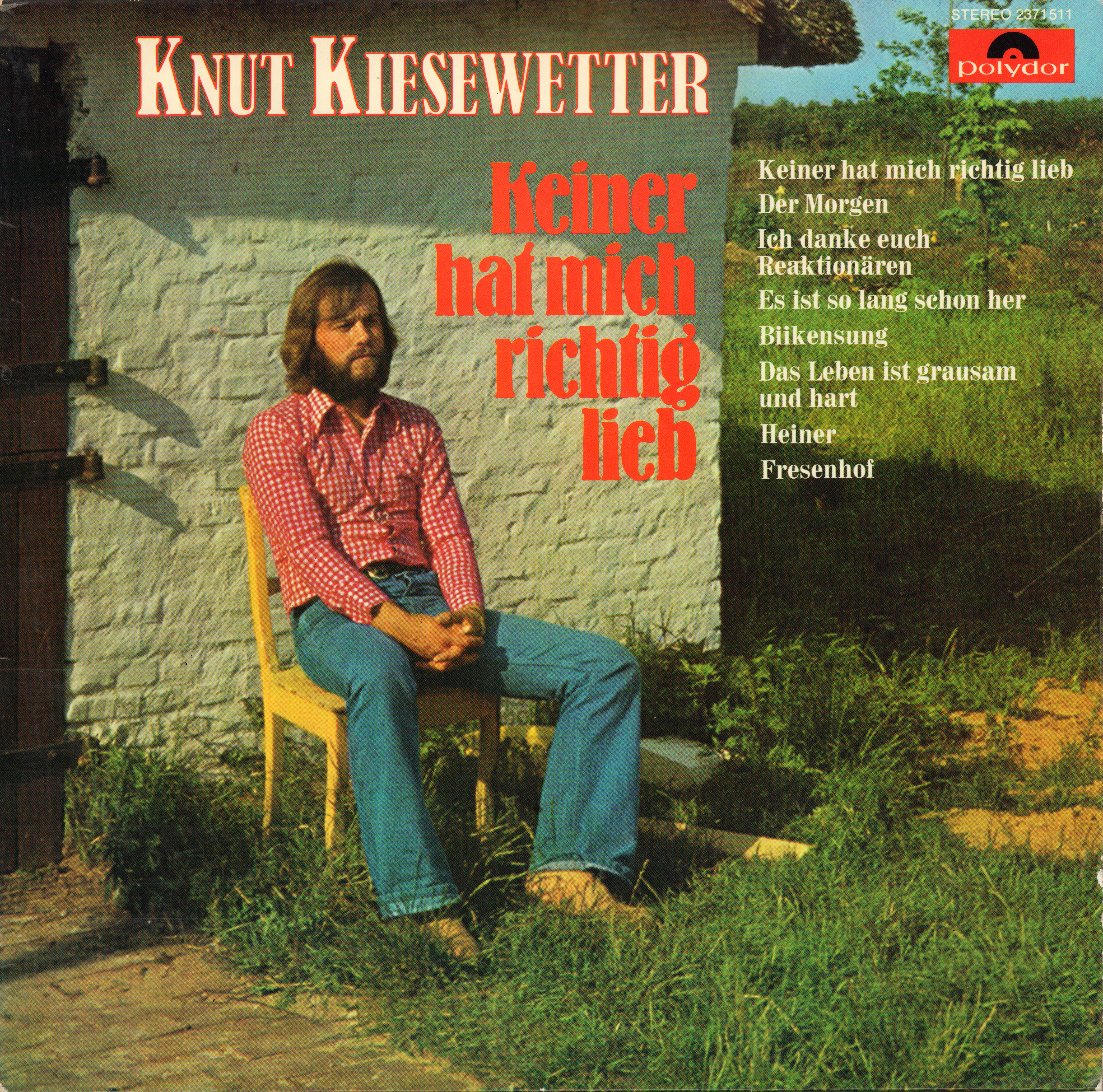
Knut Kiesewetter was a unusually versatile artist who recorded jazz, gospel, schlager, singer-songwriter stuff, even comedy and promotional songs. He also wrote a few political songs that were leftist but not dogmatic. Ich danke euch Reaktionären (Thanks, reactionaries), from the album Keiner hat mich richtig lieb, has never been reissued and is not available digitally. The lyrics are still valid after almost 50 years: “Thanks, reactionaries, you keep me on my toes. It´s time to strike back.”

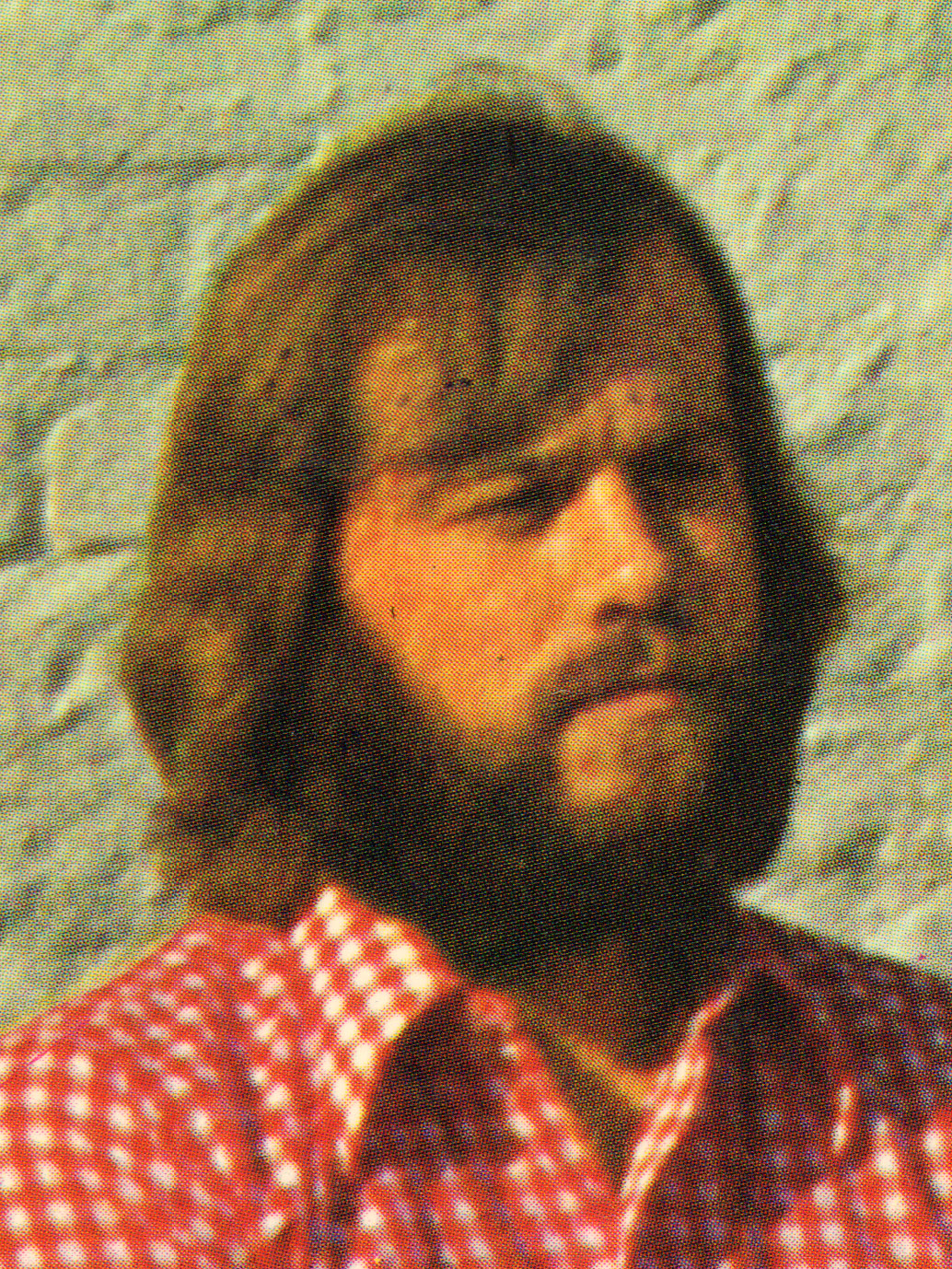
STÉPHANE STEEMAN & ALEX TRÉMISTE ET SES MENEURS, Le Temps Du Ja-Ja (Le twist du Brugeois)
Posted: September 29, 2016 Filed under: 60s, Belgium, Comedy, Political Records, Twist Records 2 Comments


 I´m currently on a visit to Brussels together with the staff of Jungle World. Yesterday I bought this EP at a second-hand record store. I did not record the A-side Théo-Party, because I do not understand it. It´s a spoken-word piece by Belgian comedian Stéphane Steeman imitating Belgian Christian-Democrat politician Théo Lefèvre.
I´m currently on a visit to Brussels together with the staff of Jungle World. Yesterday I bought this EP at a second-hand record store. I did not record the A-side Théo-Party, because I do not understand it. It´s a spoken-word piece by Belgian comedian Stéphane Steeman imitating Belgian Christian-Democrat politician Théo Lefèvre.
The political satire extends to the pseudonyms of the bands: Alex Trémiste et ses Meneurs (Al Extremist and his leaders) and Fred Eralist et ses Fanfare (Fedearalist and his fanfare) . Likely the actual band leader behind those aliases was Belgian musician and composer Jack Say ,who co-wote the songs with Stéphane Steeman.
I like the two songs on the flip. No release date given, but sometime between 1962 and 1964 – when Théo Lefèvre was Prime Minister of Belgium. Le Temps Du Ja-Ja has the subtitle: Le twist du Brugois – The Bruges Twist.
STÉPHANE STEEMAN, Le Temps Du Ja-Ja (Le Twist Du Brugeois)
STÉPHANE STEEMAN, L´Air Du Bruxelles (Brussel-Air)
DIE RUCKI ZUCKI STIMMUNGSKAPELLE, Metamorphose, 1982
Posted: September 14, 2016 Filed under: 80s, Berlin Records, Germany, Political Records, Private Pressings, Punk Records Leave a comment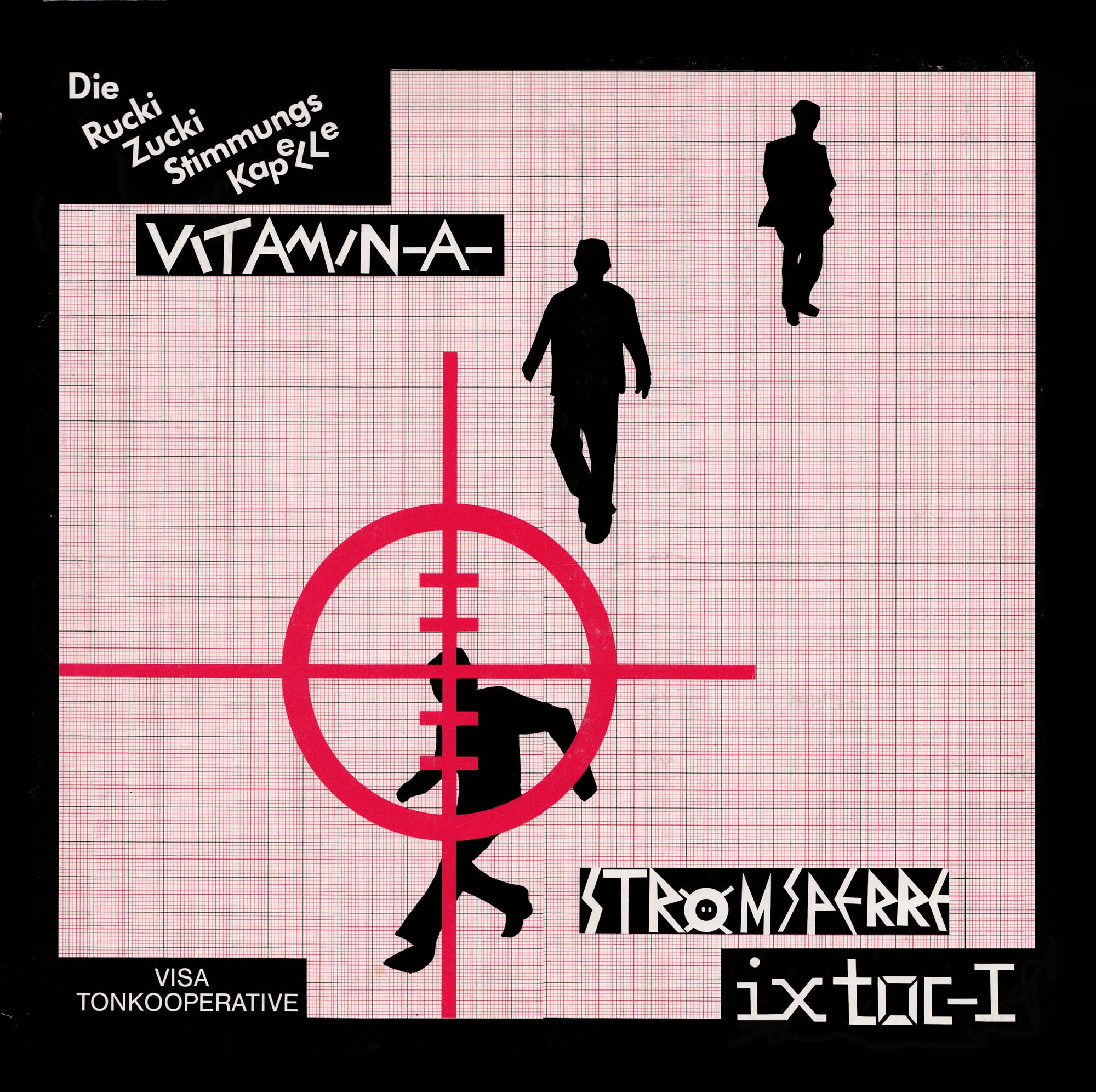


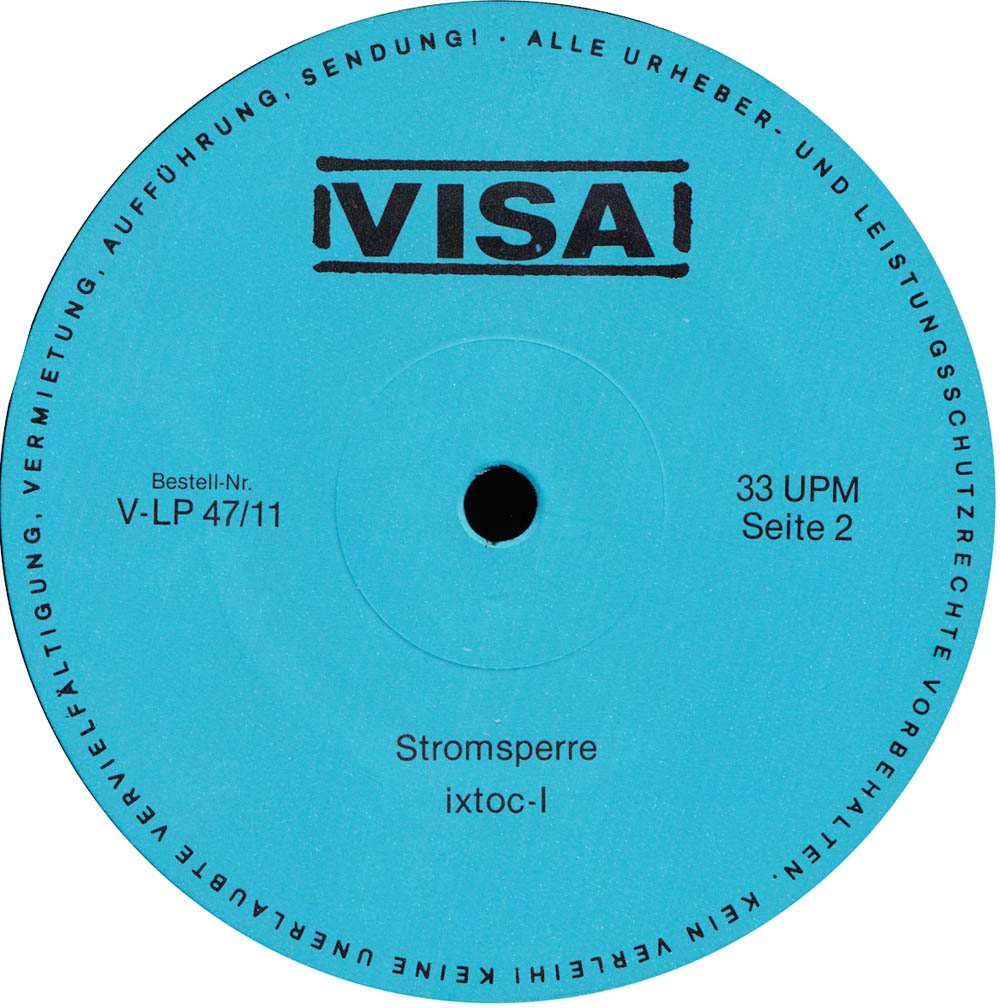 Rucki Zucki Stimmungskapelle, Vitamin A, Stromspere and Ixtoc-1 were part of the scene of the first Berlin DIY punk venue KZ 36 (36 – old zip code of Kreuzberg, KZ short for “Kulturzentrum”). In its short existence between 1980 and 1982, Karl Walterbach – a guy ten years older than most of the teenage punks of the collective – managed to release two KZ 36 albums that documented the bands from that scene. Volume II also features RZSK, Vitamin A, Stromsperre and Ixtoc-1. Walterbach later capitalized on the booming German amateur-punk movement through his label Aggressive Rockproduktionen. Tired of being exploited, the four bands took a radical anti-commercial stance and formed their own collective – VISA-Tonkooperative (Vitamin A, Ixtoc-1, Stromsperre and initially Actosin Pervers. When they broke up, Rucki Zucki Stimmungskapelle stepped in). In 1982, they put out this political DIY punk record.
Rucki Zucki Stimmungskapelle, Vitamin A, Stromspere and Ixtoc-1 were part of the scene of the first Berlin DIY punk venue KZ 36 (36 – old zip code of Kreuzberg, KZ short for “Kulturzentrum”). In its short existence between 1980 and 1982, Karl Walterbach – a guy ten years older than most of the teenage punks of the collective – managed to release two KZ 36 albums that documented the bands from that scene. Volume II also features RZSK, Vitamin A, Stromsperre and Ixtoc-1. Walterbach later capitalized on the booming German amateur-punk movement through his label Aggressive Rockproduktionen. Tired of being exploited, the four bands took a radical anti-commercial stance and formed their own collective – VISA-Tonkooperative (Vitamin A, Ixtoc-1, Stromsperre and initially Actosin Pervers. When they broke up, Rucki Zucki Stimmungskapelle stepped in). In 1982, they put out this political DIY punk record.
The complete works of Stromsperre and Vitamin A have been re-released on vinyl in the early 2000s by the Berlin punks of Rotten Totten Records. Rucki Zucki Stimmungskapelle and Ixtoc-1 have not been re-released. After more than 30 years, I think it´s time to take a closer look.
Like many other punk bands, members of Stromsperrre and Vitamin A grew up in Berlin-Gropiusstadt, the high-rise ghetto made famous by Christiane F. It still makes my mind boggle, how politicized these ghetto-teenagers were. Nurtured by Social-Democrat politics, leftist teachers and the very visible 1970s radical movement of Berlin, these guys were decidedly brave and idealistic. In the 1980s, the conservative backlash changed German society. In general, working class kids were no longer encouraged to get higher education. Today, this type of politicized working-class teenager has vanished. In fact, teenagers today don´t seem to claim any identity of their own. When I became a Teddy Boy and later discovered Hardcore-Punk, I was 14 and 16. We were all just kids. Working class kids met with rich kids through youth-subcultures. Today´s kids mostly stay were they were put by their parents. I´m stressing the word “kids”, because you can hear it on the record. Beside all the serious politics there´s a lot of goofy kids stuff on this record.
Like this short a capella introduction by Rucki Zucki Stimmungskapelle:
DIE RUCKI ZUCKI STIMMUNGSKAPELLE, Bassanova, 1982
Metamorphose should have been a hit. The saxophone gives it a post-punk feel, but it is also a political song full of bitter sarcasm:
“Soon we´ll be at the end/ Of the great experiment/ We´ll love the taste of gasoline/ We´ll need exhaust fume to breathe/ Onward, onward to the next step of metamorphosis”
DIE RUCKI ZUCKI STIMMUNGSKAPELLE, Metamorphose, 1982
Despite their silly and misleading name, Rucki Zucki Stimmungskapelle were the most musically and lyrically ambitious of the four bands. Their songs Clockwork (Uhrwerk) and Softanimals are also the only non-topical songs.
“People are scared/ Afraid to walk the streets/ I´m a colourful rocking horse/ And I´ll lend you my super-ego/ I wear a red striped shirt/ And I´m eating mom´s mail”
DIE RUCKI ZUCKI STIMMUNGSKAPELLE, Clockwork, 1982
Softanimals is a direct translation of the German “Weichtiere”, so called Mollusca – spineless animals like snails, clams and octopuses. A funny song on a serious topic:
“Soft animlas have a hard life/…/ That´s why everbody wants to be hard and angular”
DIE RUCKI ZUCKI STIMMUNGSKAPELLE, Softanimals, 1982
Another goofy bit by RZSK. You can hear that these guys are not some West-German small town transplants, but local Berlin teenagers.
The door is locked. Their buddy “Duffy” is sent to get a key….
DIE RUCKI ZUCKI STIMMUNGSKAPELLE, Breaking Glass (Daffy, what´s going on?), 1982
Ixtoc-1 named themselves after a huge oil spill in the Gulf of Mexico on 3 June 1979, shortly before they were forming. Again, despite its clever political implications, Ixtoc-1 was not a good choice for a punk band name. Ölpest (Oil Spill) would have been better. Or Katastrophe. Or Blowout. The band also recorded the 12″ Gut ist was modern ist in 1982, that was more refined and progressive, while still largely remaining punk. Why Do Things Have To Change blog posted it in February and you can get it here. The early Ixtoc-1 is a great mix of political and goofy:
Staat (The State) is an anarchist song:
“Greed rules the world/ Anything and anybody is for sale/Corruption in politics/ People want to govern people/ That´s what they call democracy/ I hardly ever works/ The good thing about the state is/ Death!”
Von oben (From The Top) is another anarchist song:
“What´s you life worth?/ Do you have the right to exist?/From the top / They want to control you/ You´re not supposed to think”
Teenage Love is a song about masturbation.
Teenagers…
Teenager indeed! Very young looking Ixtoc-1 vocalist Harald Gantzberg on the cover of a book about punk (Last Exit. Punk, Leben im toten Herz der Städte, Rowohlt 1982).
By coincidence, I found a profile and a photo of Ixtoc-1 in a Berlin rock music guide (Rock City Berlin – Das aktuelle Handbuch der Berliner Szene, 1985), that I bought some years ago in a local second-hand book store. By then, vocalist Harald Gantzberg had left the band. Incidentally, today Harald works as an editor in the comic book field! The line-up was Mathias Klötzke, bass: Lutz Werner, drums; Christian Werner, guitar. In 1984 the group was among the top-20 at the annual Senats-Rock-Wettbewerb, a government-funded battle of the bands. “Our music is a combination of entertainment and modesty. We´ve known each other since elementary school.”
Ixtoc-1 broke up in 1985.
Discogs says that the booklet that came with the LP has 18-pages, Sadly, mine is missing 6 pages. Stromsperre contributes a lot of small type anarchist writing. Their slogan is: “Musik als Waffe” – Music as a Weapon.
CELAL İNCE, Dostluk Şarkısı (The Song of Friendship)
Posted: August 31, 2016 Filed under: 50s, Flexible Records, Political Records, Turkey Leave a comment

 In May, I bought this flexi disc at a flea market in Istanbul. It wasn´t really cheap but I didn´t mind. I was on vacation and wasn´t going to pass on a 10″ flexi disc that runs on 78RPM. When I saw it, I immediately though: “blog!” But I didn´t listen to it until I got home. Then I did a little online research.
In May, I bought this flexi disc at a flea market in Istanbul. It wasn´t really cheap but I didn´t mind. I was on vacation and wasn´t going to pass on a 10″ flexi disc that runs on 78RPM. When I saw it, I immediately though: “blog!” But I didn´t listen to it until I got home. Then I did a little online research.
The record has Cold War written all over it. At the time of its release, Turkey was a buffer zone against the Soviet empire. Tens of thousands of these propaganda flexis – recorded and pressed in the Unites States by Voice Of America – were given away for free. From the feeling and graphics of the flexi, I´d guess in the midlle of the 1950s. It takes us back to the Turkey of films like From Russia With Love (1963) and Topkapi (1964), a country in-between modernism and tradition. Only, this record is not dramatized fiction, but real.
Celal İnce, born in 1921, was the king of Turkish tango in the 40s and 50s. In the in the late 50s he immigrated to the US and has lived in Chicago ever since. İnce was in the wine business for forty years and now, aged 95, is still working as an executive wine consultant. Recently Celal İnce´s Sana Nerden Gönül Verdim was featured on „Istanbul Tango 1927-1953“, the fourth volume of the German CD compilation series Old World Tangos. The series is illustrated by none other than Berlin underground cartoonist and fine art painter Guido Sieber.
In the anthemic marching song Dostluk Şarkısı, Celal İnce praises the friendship of Turkey and the United States: “We were blood brothers in Korea/Our determination is to live free , to ensure peace in the world”. It might be full of pathos and propaganda, but I can think of worse causes. The Voice Of America probably did more damage to dictatorships by broadcasting Jazz music to Eastern Europe, than all the missiles they planted near the borders.
Whatever, it´s still only a pop song…
CELAL İNCE, Dostluk Şarkısı (The Song of Friendship)
The flip features some words by Namik Kemal on Turkish history and quotes of Franklin Roosevelt, Thomas Jefferson, George Washington, Patrick Henry, Mustafa Kemal Ataturk and Ziya Gökalp.
Hürriyet Hakkında Meşhur Sözler
Some footage of the old Yeşilköy Airport, now Istanbul Atatürk International Airport, from From Russia With Love (1963)
Footage of Istanbul street life in 1964 from Topkapi (1964):
I bought some more Akbaba magazines while I was in Istanbul. This issue from March 3rd 1962, depicting US-sailors in Turkey, seems to tie in with the above record. The bold nudity is surprising for an Islamic country. The sexism and racism are not. This type of cartooning was pretty common in the 50s and early 60s all over the world.
The cover and the next two cartoons are by Necmi Riza. The cartoon below is about the Turkish Coup d´etat that took place on May 27, 1960. The politician is waiting for the military to kick his ass.i
This one is obviously about Elisabeth Taylor standing with her lawyer in court.
This issue also has this cartoon by Yurdaer Kalayci.
Yazisiz means “Without words”.
ALFIE MORGAN, Ich bin so faul, 1968
Posted: July 2, 2015 Filed under: 60s, Germany, Political Records 2 Comments

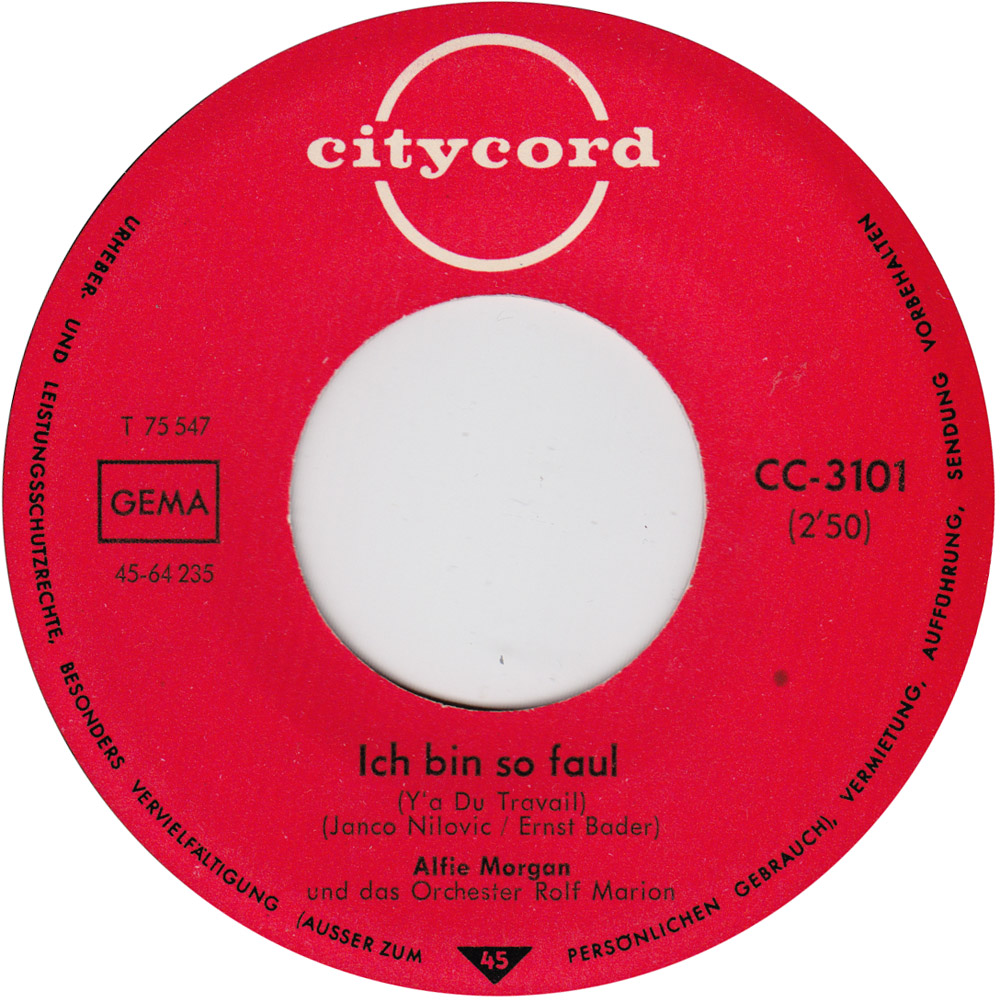
 Ich bin so faul (I´m so lazy) is a song that praises laziness. Surprisingly up-to-date, its Sirtaki rhythm and melody makes it sounds like a conservative parody of the Greek crisis. If anything, the Greek people had to work harder than any other European nations in recent years, while the obedient Germans, wo caused the crisis through massive wage cuts and overblown exports, eat up all the bullshit lies of the mainstream propaganda machine. Hopefully the brave Greek government will prevail. If not, the entire European leftist project is at stake. Capitalists are already shitting their pants, as is evident in their recent hysteria.
Ich bin so faul (I´m so lazy) is a song that praises laziness. Surprisingly up-to-date, its Sirtaki rhythm and melody makes it sounds like a conservative parody of the Greek crisis. If anything, the Greek people had to work harder than any other European nations in recent years, while the obedient Germans, wo caused the crisis through massive wage cuts and overblown exports, eat up all the bullshit lies of the mainstream propaganda machine. Hopefully the brave Greek government will prevail. If not, the entire European leftist project is at stake. Capitalists are already shitting their pants, as is evident in their recent hysteria.
Ich bin so faul is not a parody. It expresses a genuine pleasure to be lazy. I love work, too. I work for a couple of hours every day. I might not earn much, but I´m happy, because I love what I do. But what´s wrong with being lazy, anyway? What we need today, is more laziness! With Capitalist rule unchallenged for decades and everybody brainwashed into believing there is no alternative, I can´t think of a more political statement. Work is our collective obsession. In the last two years, two of my friends committed suicide because of burnout/depression, and ensuing unemployment. Both felt worthless without a job. To me those tragedies are still unacceptable and I directly blame the Capitalist ideology.
No information on Alfie Morgan, apart from the liner notes stating that he appeared in “various films in France, Austria and England” and that” his friends Omar Sharif and Michel Polnareff persuaded him to record his German début single”.
The tiny Citycord label, located in Hamburg-Sasel, was founded by Manfred Dulau and Joe Moser in 1966. Moser also co-wrote “Morgen ist ein neuer Tag”. The music to Ich bin so faul (Ya Du travail) was written by young Janco Nilovic, later a composer of library music, with lyrics by Ernst Bader. Bader, both a Christian and a Socialist, wrote countless songs for stars like Freddy Quinn, Udo Jürgens, Catarina Valente, Nana Mouskouri, Adamo and most of the German lyrics to the songs of Charles Aznavour. Despite of his wealth, he lived a very modest life, giving most of his money away. He donated to the radical-leftist APO-Press, financed the St. Pauli Museum, that is still in existence today, and guaranteed in his will, that the tenants of his condominiums had life-long habitation rights at a low rent. Photographer Günter Zint, was a friend of Ernst Bader for forty years. When Bader died in 1999, he held his obituary.
Anyway, I love the unabashed praise of the virtues of laziness in this song…
ALFIE MORGAN, Ich bin so faul, 1968
Der Tag ist heiß,/ heiß weht der Föhn/ Oh, ich bin so faul/ Ach, ist das schön/ Die Andern ackern und schaffen für sich,/ aber keiner ist froh und zufrieden wie ich./ Wenn sie sagen, ich mach´ alles völlig verkehrt,/ich finde, auch mein Leben ist was wert./ Oh, ich bewund´re den emsigen Boss,/ ganz bestimmt fällt dem Mann das Geld nicht in den Schoß,/aber ich schau´ auf blühende Felder hinaus/ und ich ruh´ mich aus./Der Tag ist heiß,/ heiß weht der Föhn/ Oh, ich bin so faul/ Ach, ist das schön./ Da schlendert froh mit verliebtem Gesang,/ schon mein Mädchen am Morgen die Strasse entlang/ und sie setzt sich zu mir dann mit fröhlichem Blick./ Und dann träumen wir beide vom großen Glück./ Für dauren Küsse, da brauch´ ich kein Geld./ Wir geniessen mit offenen Augen die Welt./ Wenn die ander´n sich plagen, dann träumen wir süß/ wie im Paradies./ Der Tag ist heiß,/ heißweht der Föhn/ Oh, ich bin so faul/ Ach, ist das schön
ALFIE MORGAN, Morgen ist ein neuer Tag, 1968
Morgen ist ein neuer Tag is a German cover version of Gene Stridel´s northern soul classic Tomorrow Is Another Day on the Atlantic label.
ALARM!, Die schönste Zeit im Leben ,1978
Posted: October 7, 2014 Filed under: 70´s, Berlin Records, Germany, Political Records, Private Pressings Leave a comment

 In 1966, a local radical leftist theatre group re-invented theatre for children. Despite criticism from the conservative mainstream, the socially conscious plays of Grips theatre became increasingly popular. Kids like me, who grew up in the early 70s, especially loved the bold and very catchy Grips songs, that were mostly written by Volker Ludwig and Birger Heymann.
In 1966, a local radical leftist theatre group re-invented theatre for children. Despite criticism from the conservative mainstream, the socially conscious plays of Grips theatre became increasingly popular. Kids like me, who grew up in the early 70s, especially loved the bold and very catchy Grips songs, that were mostly written by Volker Ludwig and Birger Heymann.
In the mid-70s Grips also started to write plays for teenagers. Grips produced a number of actors who later became famous. Heinz Hoenig (leaning over the bench, wearing sneakers) played in Die schönste Zeit im Leben, three years later he starred in Das Boot as Maat (Petty Officer) Hinrich.
These are great songs that do not deserve to be forgotten. Unfortunately so far nobody has cared to re-issue them.
( Im November 2013 schrieb ich über diese Platte bereits in der Jungle World den Text Herz, was willst du mehr. )
ALARM!, Die schönste Zeit im Leben, 1978
ALARM!, Millionör und Superfrau ,1978
ALARM!, Herz was willst du mehr (punk) ,1978
ALARM!, Bleib bei mir (Keep cool) ,1978
LINKERTON/ GRUPPE VORWÄRTS, 1977
Posted: June 3, 2014 Filed under: 70´s, Berlin Records, Germany, Political Records, Private Pressings Leave a comment

 The very first record that I posted in 2007 was similar to this one, in that it was also local, political and privately pressed. While the former was anarchist, this is a straight communist record. It was issued to commemorate the 30th anniversary of the Freie Deutsche Jugend Westberlins (FDJW), the youth organization of the Sozialistische Einheitspartei Westberlins (SEW). The Socialist Unity Party of West Berlin was more or less a Berlin branch of the SED, the governing party of East-Germany.
The very first record that I posted in 2007 was similar to this one, in that it was also local, political and privately pressed. While the former was anarchist, this is a straight communist record. It was issued to commemorate the 30th anniversary of the Freie Deutsche Jugend Westberlins (FDJW), the youth organization of the Sozialistische Einheitspartei Westberlins (SEW). The Socialist Unity Party of West Berlin was more or less a Berlin branch of the SED, the governing party of East-Germany.
In short, these cats were West Berlin fans of communist East Germany. After reunification, the party quickly dissolved. Not surprisingly, it was later revealed that East Germany had financed the party with more than 10 million German marks a year. I´m sure none of that money went into the making of this record. It´s got the touch of a genuine DIY project, from the “graphics” on the front sleeve, to the paper of the labels and the lack of any address or copyright. To say this release looks private, is an understatement, it looks clandestine.
Musically both bands are close to the radical leftist Krautrock of fellow locals Lokomotive Kreuzberg and Floh de Cologne (from Cologne). Recorded in 1977, these guys were not into fun stuff like Blitzkrieg Bop or sniffin´glue, but 37 years later their earnest commie rock is a lot funnier than most Berlin punk records of that period…
LINKERTON, Vertreter-Arie, 1977
GRUPPE VORWÄRTS, Denk´ Daran, 1977
(Ein kurzer Text über diese Platte erschien am 22. Mai als Folge 242 meiner Berlin Beatet Bestes Kolumne in der Wochenzeitung Jungle World, nachzulesen hier.)
MÜNCHNER SONGGRUPPE, Dürer-Lied/ Lied vom Bayernland, 1971
Posted: September 7, 2013 Filed under: 70´s, Cartoon Sleeves, Germany, Political Records Leave a comment


 It´s hard to believe today, that Germany´s “Bible Belt”, way down in the south, used to be a hotbed of communist activity, dating back to the Bavarian Soviet Republic of 1918/1919. In the late 1960s, a group of communist musicians, the Münchner Songgruppe, were still rallying for the revolution.
It´s hard to believe today, that Germany´s “Bible Belt”, way down in the south, used to be a hotbed of communist activity, dating back to the Bavarian Soviet Republic of 1918/1919. In the late 1960s, a group of communist musicians, the Münchner Songgruppe, were still rallying for the revolution.
Dürer-Lied deals with the public celebration of the 500th anniversary of the birth of Renaissance artist Albrecht Dürer (1471-1528). Sung in Franconian dialect, it claims that, in contrast to the official appraisal by the Bavarian upper class and conservative political elite, “Dürer´s warm painter´s heart was close to the peasants.” It points out, that the capitalists do not own Dürer and that “Not before that mob is gone, will we, the workers – the peasants of today – finally “own” Dürer. Everything for the workers – Nothing for the corporations. You don´t own shit!
“…und Euch gehört ein Dreck!”
Recorded live in Nürnberg in 1971.
MÜNCHNER SONGGRUPPE, Dürer-Lied, 1971
Lied vom Bayernland is a bold criticism of the ownership structure in Bavaria. The catchy chorus links the notorious head of the Bavarian governement Franz Josef Strauß and his “gang” to the Neo-Nazis, calling them “Bavaria´s worst plague”.
“Strauß und seine Bazis/ und die Neo-Nazis, / die sind Bayern größe Plag.”
Recorded live at the Arbeiterlieder-Festival in Essen in 1970.
MÜNCHNER SONGGRUPPE, Lied vom Bayernland, 1971
The leftist Pläne label was most probably the oldest German independent label. Founded in 1961, their records were initially sold independently through grass roots distribution. In the 1980s it changed distribution to Rough Trade, still mostly focusing on political singer-songwriter material, but also releasing a heap of extraordinary rock, jazz, and even some punk/new wave records. Almost unnoticed by the German entertainment industry, Pläne went out of business, after 50 years, in 2011.


















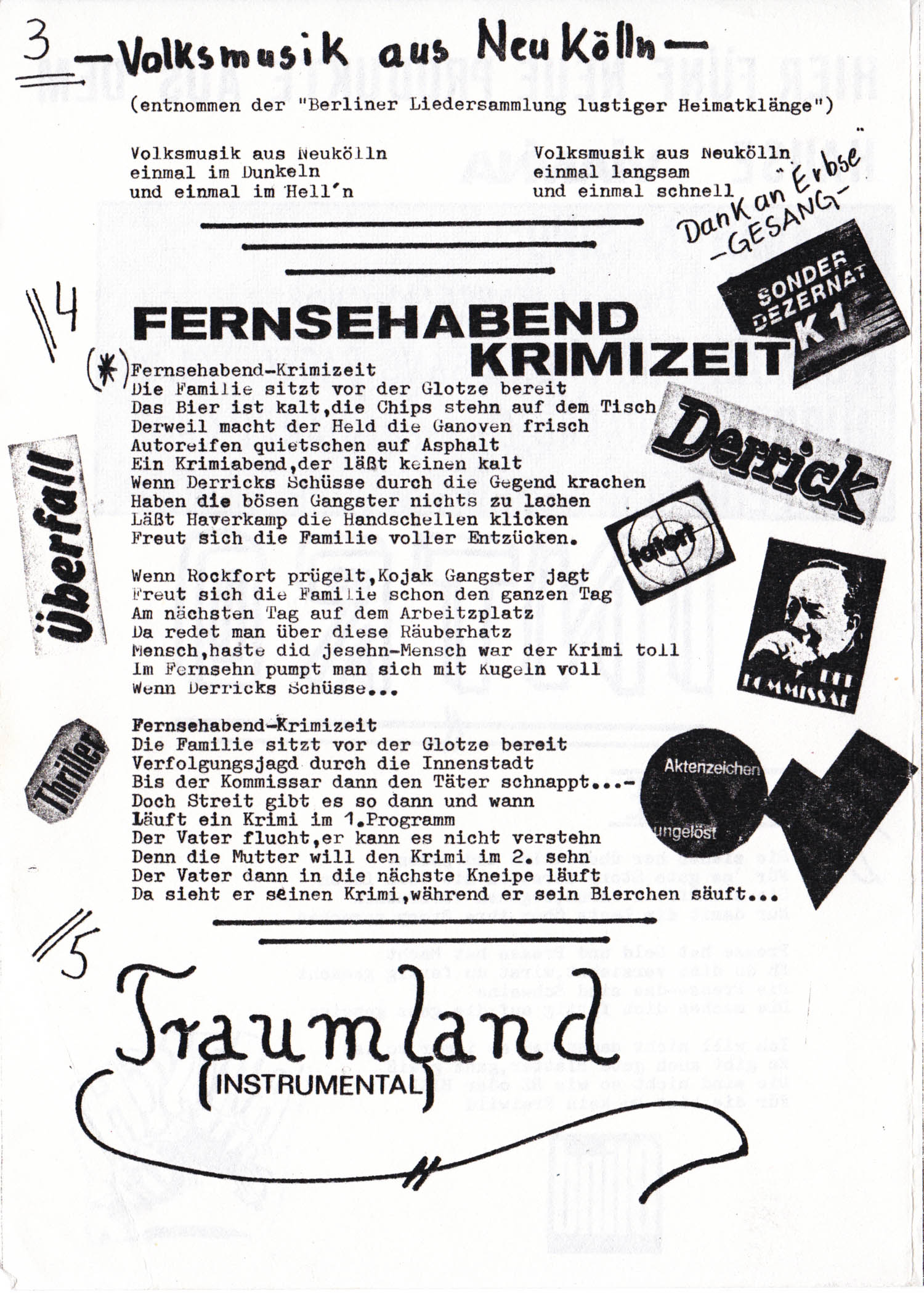











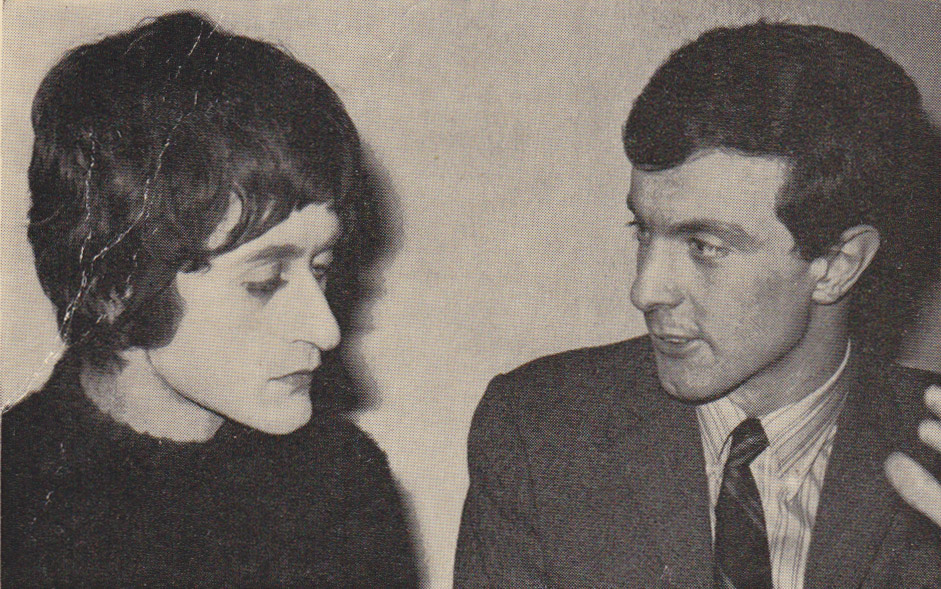
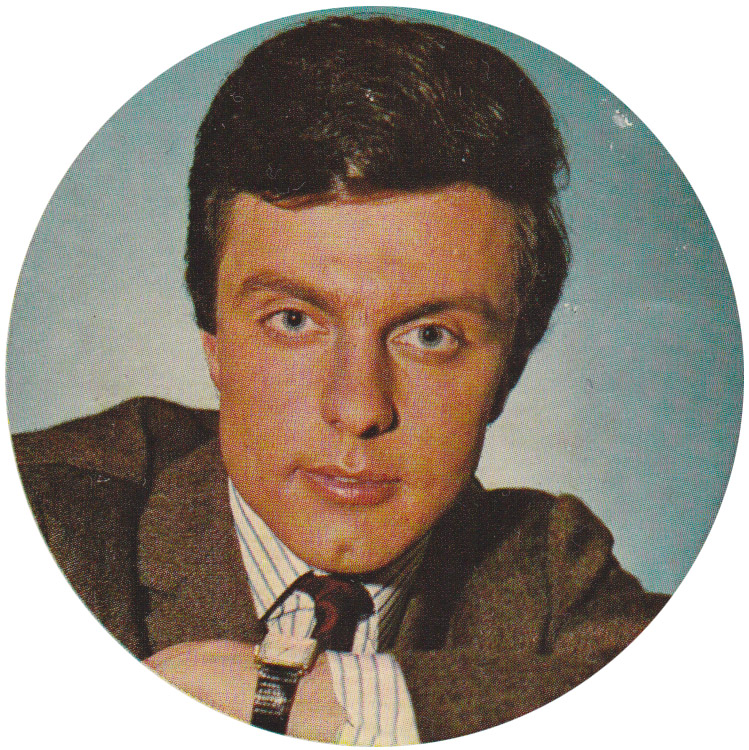
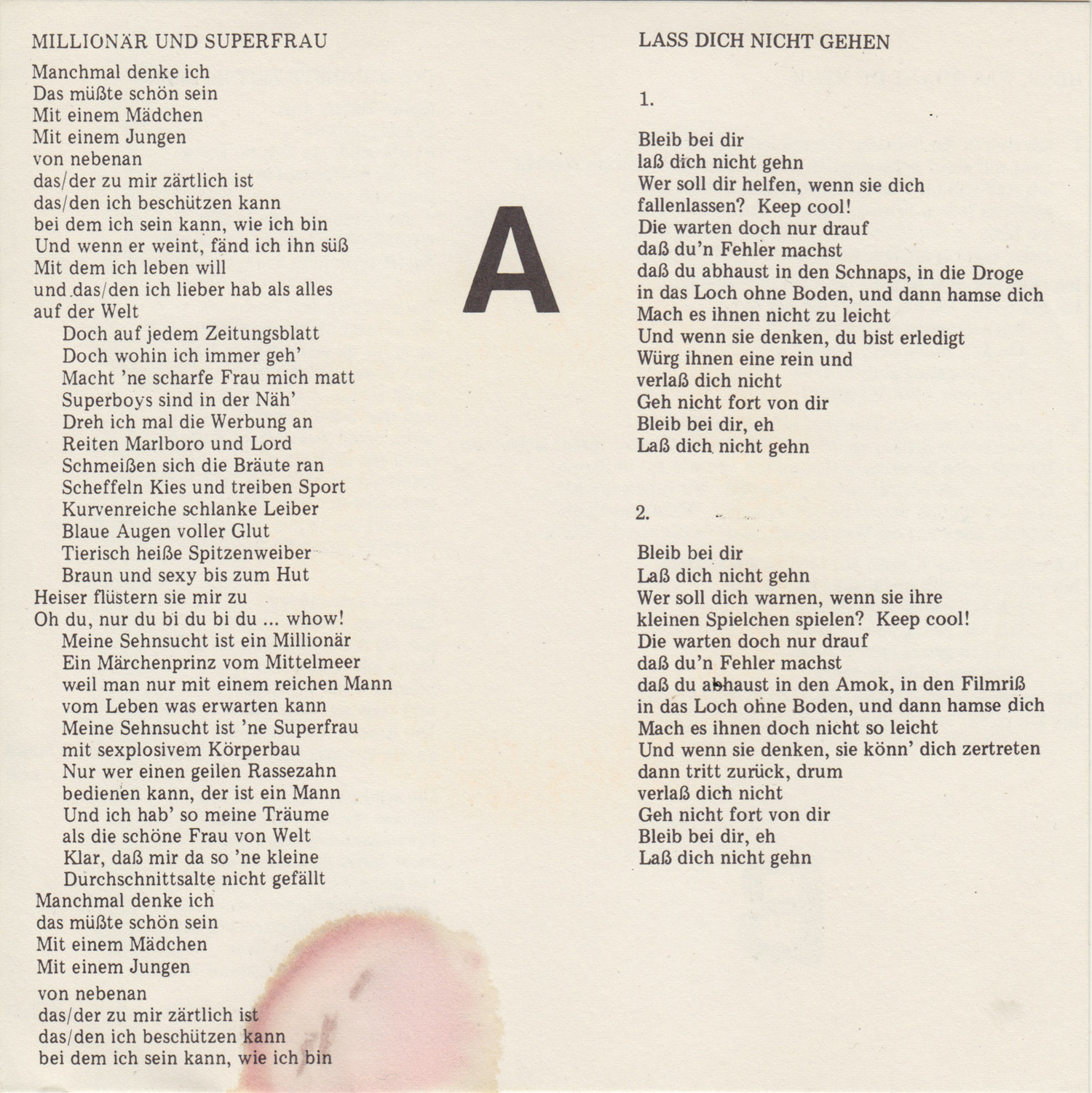



 About me:
My name is Andreas Michalke. I´m a cartoonist from Berlin, Germany and I like collecting records. Most of the records I find in thrift stores or at flea markets here in Berlin. I like a lot of music but I thought I`d focus on odd German records. Preferably with cartoon covers.
All my scans are high-resolution. If you double-click on them they will get much bigger.
About me:
My name is Andreas Michalke. I´m a cartoonist from Berlin, Germany and I like collecting records. Most of the records I find in thrift stores or at flea markets here in Berlin. I like a lot of music but I thought I`d focus on odd German records. Preferably with cartoon covers.
All my scans are high-resolution. If you double-click on them they will get much bigger.
Recent Comments